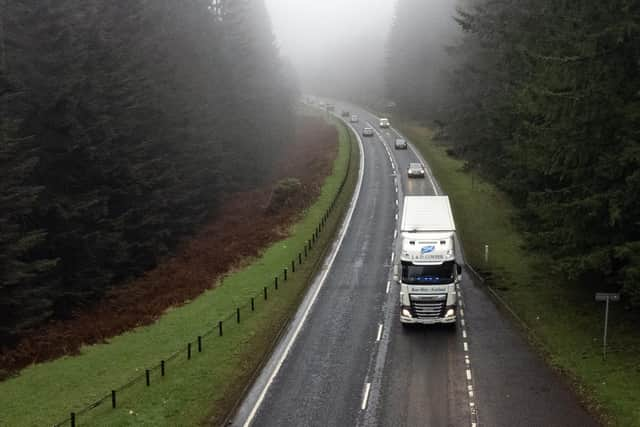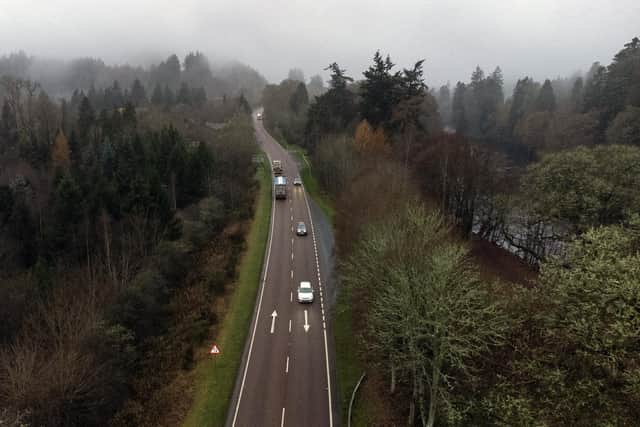A9 dualling: Slow progress while death toll mounts causes SNP 'considerable internal discomfort'
Soon after taking power, SNP ministers announced it would complete dualling of the A9 between Perth and Inverness – the road along the backbone of Scotland that connects the Central Belt with the Highland capital. In 2011, they dramatically upped the stakes with a hugely-ambitious target of finishing the job by 2025 in a project then estimated to cost £3 billion and be one of the biggest in the country’s history.
More than a decade on, there’s little on the ground to show for it, with just 11 miles of dualling added in two sections and more than 70 miles still to go. Moreover, Scotland on Sunday can reveal significant construction industry disquiet about the remaining work, with several firms said to have pulled out of the contest to build the next section, between Tomatin and Moy, south of Inverness. The winner is scheduled to be announced by this month, but after more than a year since the last stretch to be dualled opened, south of Dunkeld, a question mark hangs over when the next stage of work will even begin.
Advertisement
Hide AdAdvertisement
Hide AdCasting a dark shadow over the far-from-finished mega project as barely two years remain until the end of 2025 is an unexpected and substantial rise in the death toll on the road, since improving safety was seen as a key justification for dualling.


After a single fatality in each of the past three years on the A9 between Perth and Inverness, the total has soared to 13 so far this year, all but one on sections of the route still to be upgraded to dual carriageway and the highest for 12 years. “It has caused SNP MSPs considerable internal discomfort,” according to an industry source. "It should have almost been finished by now, and if they had really been serious about it, they would have been able to.”
A party source did not disagree. “It’s been the longest pledge on the SNP’s books and in the manifesto for seven elections at Holyrood and Westminster,” they said. “But lip service is being paid to the commitment and the money is not being put in. People want good transport links, but they are losing faith with the SNP Government.”
The increased fatalities in 2022, which have included two triple-fatal crashes and one involving two deaths, contributed to Scotland’s road death toll rising above its five-year average this summer and has increased the pressure on Police Scotland, which said on Friday it had been an “intense and demanding period”. Deputy Chief Constable Fiona Taylor: “Each of these fatalities is a tragedy. Reducing the number of road casualties is a priority and we work alongside the Scottish Government, Transport Scotland and others to do so.”
But a squeeze on funding and rising interest rates appears to have created a bleak outlook for accelerating the dualling work, seen as likely to reduce the casualty toll. Despite all but one of the nine remaining sections completing their “statutory processes” before construction can begin, transport minister Jenny Gilruth told MSPs last month that Transport Scotland has still to decide how they will be procured – funded and built. This is despite the Scottish Government agency saying it had expected a “market consultation” over this to be completed in the summer of last year. The route of the last section, near Dunkeld, has not even been agreed.


According to an industry source, there is “deep frustration” within the agency at the lack of progress. Construction firms believe the only way of making progress towards the 2025 target is for the work to be privately financed, like some previous road projects, where the cost is paid back over decades, but interest rate increases are said to have made this look unaffordable.
There are also grumbles about Transport Scotland’s contracts leaving firms unable to make any money on such work, even if such an approach may be good for the taxpayer, such as in seeing past schemes such as the M80 upgrade between Glasgow and Stirling being finished on time and budget. The industry source said the lack of appetite for A9 dualling work among large firms had even led to the possibility of the contracts being split into smaller sections in an attempt to attract smaller Scottish and other companies. However, this is seen as likely to extend the completion date even further. “It’s going to take a lot longer,” they said.
The source also said that while the £3bn cost, which is now referred to by Transport Scotland as “at 2008 prices”, may be even higher than the current equivalent of nearly £4.5bn because construction industry inflation is running at some 20 per cent.
Advertisement
Hide AdAdvertisement
Hide AdIn its response, parts of Transport Scotland’s statement were unchanged on what it issued in June. It said work was ongoing “to determine the most suitable procurement options for the remaining sections”, with £431 million spent on the project to date.


Its spokesperson said: “This is a complex exercise which is looking at a number of factors, including how the programme can be delivered most efficiently by the industry within the original cost estimate, whilst minimising disruption to road users and helping to support economic recovery post-Covid.” The body said “market engagement” was part of the procurement process.
They would say only the Tomatin-Moy section was “in procurement, and will be subject to our normal tender evaluation and business case approval processes”, so “it would not be appropriate to comment further”.
However, the spokesperson admitted a potential funding problem with the project. They said: “The Scottish Government has been clear that it has not been possible to fund all the commitments from the 2021 capital spending review. We know this will need to be reviewed again as the outlook for the UK capital grant allocations is not optimistic and inflationary pressure remains high.”
Inverness and Nairn SNP MSP and former rural economy secretary Fergus Ewing, who has long campaigned on the issue, said completing the dualling was an “absolute imperative”. He said: “It is essential that further progress is made on delivery of our pledges to dual the A9 in my constituency. Further progress means revised timetables for completion and clarity on when each section is to be dualled.
"I continue to work with my colleagues in the Scottish Government towards implementing our long-standing promises to the people of the Highlands. The tragic loss of life this year shows that dualling is needed to improve safety and reduce further fatalities.”
Graham Simpson, the Scottish Conservatives transport spokesperson, said: “All we seem to get from the SNP is dither, delay and excuses. We know the Scottish Government has the money – they have £2bn unspent, for example. Transport Scotland need to take a good look at themselves because I have certainly heard of contractors who don't want to deal with them.
“There are whole series of vital projects, like the A9, the A96, the A82 and others that we need to get on with. Jenny Gilruth should call her officials in and tell them to hurry up.”
Advertisement
Hide AdAdvertisement
Hide AdNeil Bibby, his Scottish Labour counterpart, said: “Is anyone surprised a Scottish Government propped up by the Greens is failing our country’s motorists? This is becoming a pattern of over promising and under delivering in every part of the country.
"The Scottish Government and Transport Scotland are seeing key projects, which are vital to both economic growth and road safety, being tangled in complexity, causing delays and rising costs.”
Neil Greig, policy and research director of the IAM RoadSmart motoring group, who also sits on the official A9 Safety Group, said: “Smaller contracts can only mean even more roadworks for longer and that must be even more bad news for the Highland economy.”
Comments
Want to join the conversation? Please or to comment on this article.